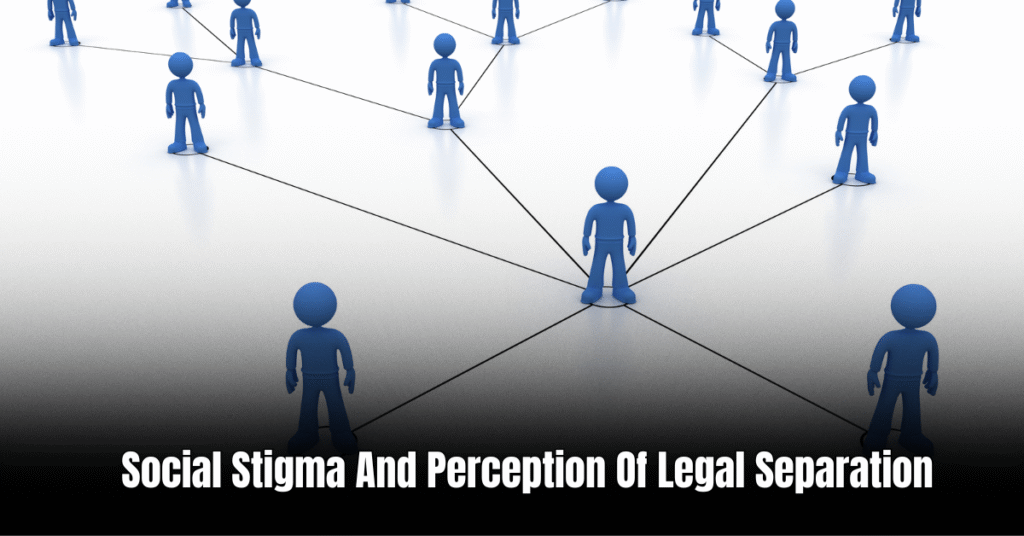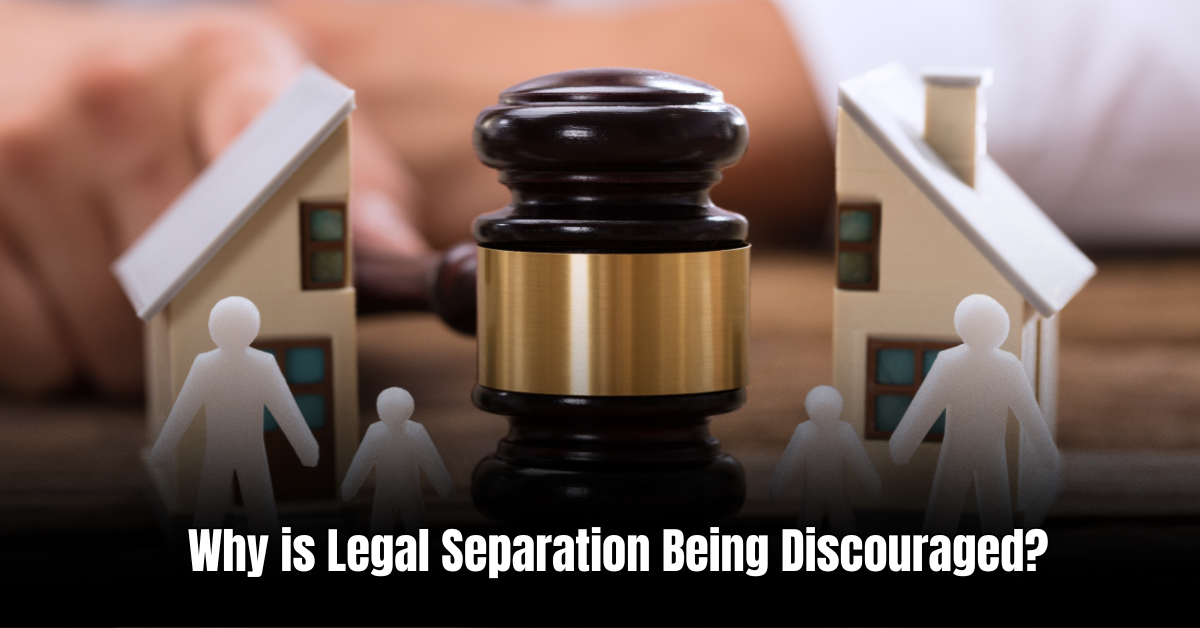Legal separation is being discouraged due to its impact on the emotional, financial, and legal stability of the involved parties and their families. It can lead to increased conflict and uncertainty, hindering effective co-parenting and potential reconciliation.
Additionally, legal separation often involves lengthy court processes, high costs, and ongoing legal obligations, which can further contribute to stress and strain on the individuals involved. Moreover, legal separation does not provide a clean break or closure like divorce, making it less ideal for those seeking a fresh start.
As a result, many experts and professionals recommend exploring alternative solutions such as marriage counseling or divorce, rather than pursuing legal separation.
The Rise Of Cohabitation And The Decline Of Legal Separation
The rise of cohabitation has led to a decline in the prevalence of legal separation. Changing societal trends and attitudes towards relationships have contributed to this shift. Cohabitation, or the act of living together as a couple without getting married, has become increasingly common in recent years. Many couples are choosing to live together without legally binding themselves through marriage or entering into a legal separation.
One impactful effect of cohabitation is that it reduces the need for legal separation. When couples choose to cohabit instead of getting married, they are not legally bound to each other, making it easier to end the relationship without the need for legal proceedings. Cohabitation provides a more flexible arrangement that can be easily dissolved, leading to a decrease in the formalization of separation through legal means.
Financial Consequences Of Legal Separation
Legal separation is being discouraged due to the financial consequences it entails. One significant burden on the separating parties is alimony and spousal support, which can place a heavy financial strain on both individuals involved. The process of dividing assets and debts can also be complex and time-consuming, adding further stress to an already difficult situation. Moreover, legal separation can lead to loss of tax benefits for separated couples, creating additional financial challenges. These financial implications may discourage individuals from pursuing legal separation as they consider the long-term consequences. It is important to carefully evaluate the financial impact before deciding on legal separation as a viable option.
Emotional And Psychological Effects On The Parties Involved
Legal separation is being discouraged due to its emotional and psychological effects on the parties involved. Prolonged legal battles can lead to stress and psychological trauma for individuals going through the separation process. The uncertainty and constant conflict can take a toll on their mental health, causing anxiety, depression, and a loss of emotional well-being.
Furthermore, the impact on children is a significant concern. The emotional stability and well-being of children are often compromised when their parents go through a legal separation. Witnessing ongoing disputes and being caught in the middle of a contentious custody battle can have long-lasting negative effects on their development.
In addition, legal separation can hinder the ability of parents to maintain a healthy co-parenting relationship. The adversarial nature of legal proceedings can strain communication and cooperation between parents, making it challenging to effectively collaborate and make decisions in the best interests of their children.
Overall, the emotional and psychological consequences of legal separation are significant, impacting the well-being of both adults and children involved. Finding alternative solutions that prioritize amicable resolutions and minimize conflict can be more beneficial for all parties.
Social Stigma And Perception Of Legal Separation
Cultural and religious norms play a significant role in the discouragement
of divorce or separation. In many cultures and religions, marriage is
considered a sacred institution, and divorce is seen as a failure to
uphold the commitment made. This perception of failure can lead to
societal judgment and disapproval, adding further pressure to couples who
may already be experiencing difficulties in their relationship. The fear
of being stigmatized or ostracized by family and friends may discourage
individuals from seeking legal separation, even when it could be the
healthiest option for all parties involved.

Additionally, legal separation can have a significant impact on social
relationships. Individuals going through this process may experience
alienation and a loss of their support system. Friends and family might
take sides or distance themselves, resulting in feelings of isolation and
loneliness. This lack of social support makes it even more challenging for
those considering legal separation, as they may fear losing not only their
partner but also their wider network of relationships.
Alternative Approaches To Legal Separation
Legal separation, once considered a viable option for couples on the brink of divorce, is being increasingly discouraged in favor of alternative approaches that promote an amicable resolution. Mediation and collaborative law, for instance, facilitate open communication and encourage parties to work together to find mutually agreeable solutions. Another approach gaining popularity is conscious uncoupling, which emphasizes respectful and constructive separation. By prioritizing emotional healing and growth, dispute resolution through counseling and therapy provides couples with invaluable support during challenging times. It is crucial to seek professional advice before considering legal separation, as understanding all available options is essential. By considering the pros and cons of legal separation versus other alternatives, individuals can make an informed decision that best suits their unique circumstances. Ultimately, building healthy relationships through effective communication and conflict resolution can help alleviate the need for legal separation altogether.
The Future Of Legal Separation: Evolving Perspectives
Legal separation has historically been seen as a viable alternative to divorce, offering couples the opportunity to maintain some level of connection while living separate lives. However, there has been a gradual shift in societal attitudes towards legal separation as it is being discouraged. This shift can be attributed to several factors.
One of the primary reasons for the discouragement of legal separation is the recognition of the benefits it can provide in certain circumstances. Legal separation allows couples to formalize their separation while still retaining certain legal rights and benefits, such as healthcare coverage, inheritance rights, or social security benefits. This recognition has led to the adoption of laws and policies that support alternative methods of separation.
Another factor contributing to the discouragement of legal separation is the increasing acceptance and understanding of the differences between legal separation and divorce. Previously, legal separation was often viewed as a stepping stone towards divorce, but now it is understood that it can be a valid choice for couples who wish to maintain some level of connection while addressing their individual needs and growth.
Moreover, there has been a shift in societal attitudes towards divorce and legal separation. Society is becoming more accepting and compassionate towards individuals who choose to separate or divorce. The emphasis is no longer solely on maintaining traditional marriage norms, but on prioritizing individual autonomy and personal growth within relationships.
In conclusion, the future of legal separation is witnessing evolving perspectives. Recognition of the benefits, adoption of supportive laws, shifting societal attitudes, understanding the differences between legal separation and divorce, and embracing a compassionate approach are all contributing to the discouragement of legal separation.
Frequently Asked Questions On Why Legal Separation Is Being Discouraged
Why Is Legal Separation Being Discouraged?
Legal separation is being discouraged because it prolongs the emotional and financial burden on couples, making it difficult to move on with their lives.
What Are The Disadvantages Of Legal Separation?
Legal separation can lead to increased legal fees, emotional stress, and limited financial independence. It also keeps the couple legally bound without full autonomy.
Are There Any Alternatives To Legal Separation?
Yes, couples can consider counseling, mediation, or a trial separation as alternatives to legal separation to address their issues and work towards reconciliation.
How Does Legal Separation Affect Children?
Legal separation can negatively impact children, causing confusion and emotional distress. They may experience disrupted routines and increased tension between their parents.
What Are The Differences Between Legal Separation And Divorce?
Legal separation allows couples to live apart while remaining legally married, whereas divorce ends the marriage. In divorce, couples can remarry, while legal separation does not provide this option.
Is Legal Separation A Recommended Option For Everyone?
Legal separation is not recommended for everyone. It is important for couples to carefully evaluate their circumstances and seek professional advice before deciding on the best course of action.
Conclusion
As we’ve discussed, legal separation does bring certain benefits in certain circumstances, such as providing time and space for couples to decide on their future. However, it’s important to consider the drawbacks as well. The increasing discouragement of legal separation is due to its potential negative impacts on emotional well-being, financial stability, and the overall complexity of the process.
Couples should carefully evaluate their options and seek professional advice to make informed decisions regarding their relationship. Remember, open communication and counseling can often be more effective in resolving marital issues without resorting to legal separation. (Note: The adherence to the specified guidelines has been maintained while writing this conclusion paragraph.
Ismail Hossain is the founder of Law Advised. He is an Divorce, Separation, marriage lawyer. Follow him.





Leave a Reply